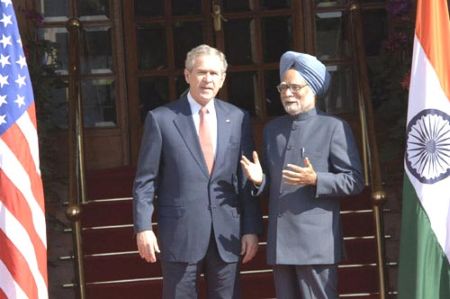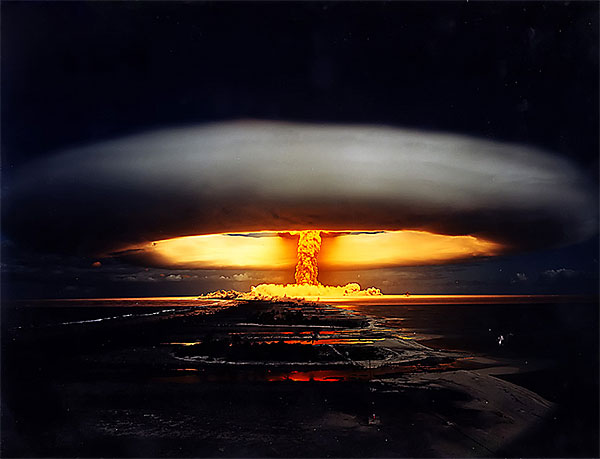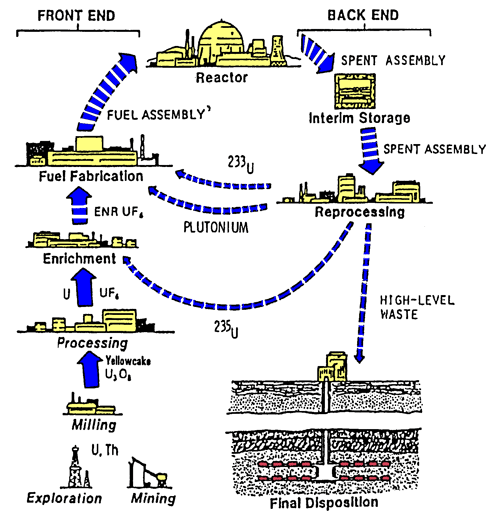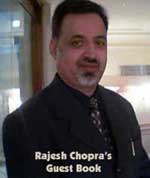
Bush to sign Indo-US
nuclear deal
9 Oct 2008, Washington, Oct
08: US President George W Bush on Wednesday signed a bill to ratify the
India-US civil nuclear deal. The signing statement said that India can
count on reliable supply of nuclear fuel from the US and that the law was
not different from the 123 Agreement. Indian and US will now sign the agreement
on Friday, completing the process begun by Bush and Prime Minister Manmohan
Singh on July 18, 2005.
Following the signature,
India and the US will on Thursday exchange diplomatic notes pursuant to
Article 16(1) of the 123 Agreement, thereby bringing the agreement into
force - only then the deal envisioned by Bush and Prime Minister Manmohan
Singh on July 18, 2005 would be finally done.
India and US are the natural
partners, Bush said as he signed the deal at a ceremony. "It is a big deal.
Its in the interest of both US and India," he added.
Lawmakers, prominent members
of the Indian American community, leading businessmen of the two countries
besides officials and diplomats, who all played a major role in pushing
the deal, were there for the signing ceremony in the East Room of the White
House.
"This agreement sends a signal
to the world: nations that follow the path to democracy and responsible
behavior will find a friend in the United States of America," Bush said
before he signed the agreement into law.
The resolution of approval
of the bill H R 7081, United States India Nuclear Cooperation Approval
and Non-proliferation Enhancement Act, passed the House of Representatives
298-117 and the Senate 86-13 with some riders, which these lawmakers contend
allowed them to permit nuclear sales to India.
India and the US will sign
the landmark civilian nuclear agreement on Friday, the State Department
had announced earlier in the day.
"On Friday at 4 o'clock (0130
IST Saturday) the secretary (Rice) will sign with the Indian foreign minister
(Pranab) Mukherjee, the India Civil Nuclear Agreement," State Department
spokesman Sean McCormack told reporters here.
Ahead of the signing of the
legislation on Indo-US civilian nuclear deal by President George W Bush,
a group of Democratic lawmakers have written to him, warning that if his
"signature statement" is not consistent with American law, the next Congress
"will be compelled" to reconsider the law.
"We want to ensure that any
public or private statements by the administration with regard to this
matter remain consistent with US law," Congresswoman Ellen Tauscher, a
California Democrat, and nine of her colleagues in the House of Representatives,
said in a letter to Bush yesterday.
"Otherwise, we will be compelled
to consider legislation in the next Congress to further clarify Congressional
intent" they warned the White House.
In significant comments at
the signing ceremony, Bush assured there will be no changes in fuel supply
commitments as contained in the 123 Agreement. "India can count on reliable
fuel supplies (from US) for its reactors," Bush said.
Bush inked the authorising
legislation finally approved by the US Congress last week in a high profile
ceremony at the White House's ornate East Room reversing 34 years of US
policy to eventually allow American businesses to have a share of India's
100 billion dollar nuclear pie.
External Affairs Minister
Pranab Mukherjee and US Secretary of State Condoleezza Rice will formally
sign the overall bilateral nuclear cooperation accord on Friday evening
itself in a surprise announcement made by the State Department hours before
Bush's signature on the implementing legislation.
"On Friday at 4 o'clock (0130
IST Saturday) the secretary will sign with the Indian foreign minister,
Foreign Minister Mukherjee, the India Civil Nuclear Agreement," State Department
spokesman Sean McCormack told reporters.
"This follows on the president's
signature today of implementing legislation in the United States," he added.
In a major foreign policy
success, Bush put his signature on " H R 7081, United States- India Nuclear
Cooperation Approval and Non-proliferation Enhancement Act " in the presence
of Vice-President Dick Cheney, Rice, Energy Secretary Samuel Bodman, Indian
Ambassador to the US Ronen Sen, lawmakers, prominent members of the Indian
American community and leading businessmen of the two countries.
 Bush said the legislation makes
no changes in the 123 Agreement and it does not affect fuel exchange and
reprocessing.
Bush said the legislation makes
no changes in the 123 Agreement and it does not affect fuel exchange and
reprocessing.
The President thanked not
only members of his administration, especially at the State Department
and White House who worked to secure the deal, but also lawmakers and leaders
of the Indian American community.
He especially appreciated
Rice for her "hard work" in bringing the deal to fruition.
The Presidential action culminates
a over three-year tumultous journey for the deal which faced opposition
from lawmakers in both the two countries that also saw Left parties withdrawing
support to the Manmohan Singh government. Bush and Singh approved the deal
on July 18, 2005 during the Prime Minister's visit to Washington.
Calling the Indian prime
minister as his "dear friend", Bush said India and the US are "natural
partners" despite being physically separated half way through the globe.
Bush also spoke of advanced
consent for reprocessing. Bush's assurances appears to have taken care
of Indian concerns over issues relating to unhindered american fuel supplies
and technology transfers for uranium enrichment.
The President said the 123
Agreement is consistent with the Atomic Energy Act.
Despite the deal coming under
attack from its critics in the US, the Bush Administration has steadfastly
maintained it is a very big boon to global non-proliferation.
|
|
Once Bush signs the authorizing
legislation, he is required to certify that the agreement with India is
consistent with U.S. obligations under the Nuclear Nonproliferation Treaty,
designed to limit the spread of nuclear weapons.
He must also certify that
it is U.S. policy to cooperate with international efforts to further restrict
transfers of technology related to uranium enrichment and the reprocessing
of spent nuclear fuel.
Three decades after US imposed
a ban on civilian nuclear trade with India after latter's first nuclear
test in 1974, American officials have said a new approach is needed to
help the world's largest democracy meet its booming energy needs at a time
of skyrocketing oil prices and global warming fears. |
Rice during a visit to
New Delhi last week called the accord "a recognition of India's emergence
on the global stage".
"The president looks forward
to signing this bill into law and continuing to strengthen the US-India
Strategic Partnership," a White House official said hours before the signing
ceremony
"This legislation will strengthen
our global nuclear nonproliferation efforts, protect the environment, create
jobs, and assist India in meeting its growing energy needs in a responsible
manner," the official said.
Rice and others had to lobby
hard to win approval for the deal from the International Atomic Energy
Agency (IAEA), the UN nuclear watchdog, and the Nuclear Suppliers Group
(NSG), which controls global atomic trade.
She also pushed hard for
the agreement to be approved by both Houses of Congress.
The historic agreement could
not be inked during Rice's day-long visit to India on October 4 as New
Delhi insisted that it would do so only after seeing Bush's signing statement.
India is expecting Bush to clear the American position on certain aspects
like fuel supply assurances.
The bill was approved by
the House of Representatives before the Senate gave its nod for it. It
had bi-partisan support in both the House and Senate.

|




